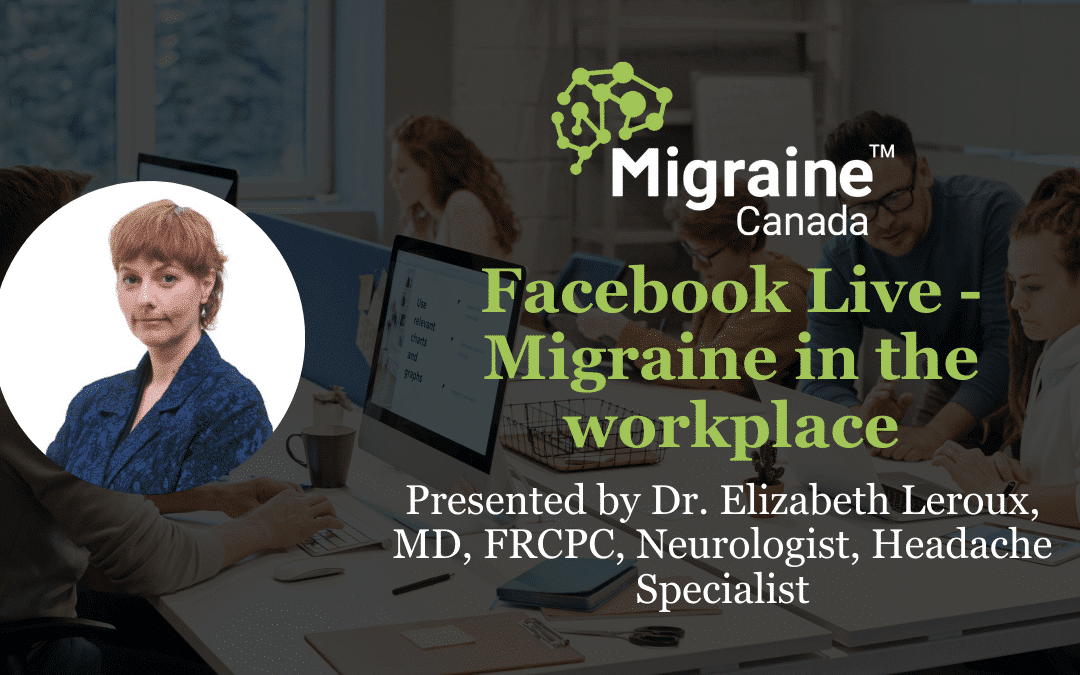Work and Disability
You missed work because you had a migraine. Which do you get from your employer and co-workers: support or suspicious looks?
Migraine is most prevalent among working-age adults and can significantly affect their professional lives. However, with proper workplace support, the impact of migraines can be greatly minimized.
People with migraines typically require minimal assistance from their employers, but even a small amount of support can make a crucial difference in helping them manage their condition and perform effectively at work.
Without this necessary support, people with migraine may face serious challenges in the workplace and undue stress because of stigma. To create a healthier, stigma-free and productive workplace, employers and employees need to work together. Implementing solutions will lead to lower absenteeism, reduced functional impairment, and improved employee well-being and productivity.
According to a Canadian survey on 1202 employees
For every 100 employees.
Report having migraine
Are diagnosed by a
healthcare provider
Have migraine more
than twice a week

Migraine is a leading cause of absenteeism (missed work days)
Migraine should be a top priority for employers and disability insurance companies. It is a significant cause of lost productivity in the workplace.
- According to a study done in Canada on 28 000 employees on 16 health conditions, migraine came third for cost related to missed days at work after back pain and mood disorders. Migraine was more costly than asthma, diabetes, cancer and arthritis. (Zhang)
- Among Canadian employees, 56% had taken sick days, 23% were on short term disability, and 18% were on long term disability.
- Migraine Canada found that only 20% of people with migraine (all severity) did not miss days of work. 36% missed between 4 and 16 days per year. 25% reported being disabled.
Migraine is stigmatized and not recognized as a medical cause of disability.
According to an interesting study on stigma related to migraine and epilepsy, people with chronic migraine were more stigmatized than people with epilepsy and episodic migraine. Stigma was directly related to ability to work. (Young)
The “Blue Book” of official diseases leading to disability in the US does not include migraine. The consequence: patients disabled by chronic migraine have to use mental health diseases to claim disability recognition.
The process to obtain disability recognized is difficult and requires a lot of collaboration from treating physicians. Considering the data provided by the World Health Organization, is this fair and reasonable?
Breaking the stigma will start with education and sharing.

How Migraine Canada is Supporting Workers like You
Migraine Canada will developing a Canadian Migraine at Work program in 2025. While we are busy developing a program and resources relevant to Canadians, our colleagues in other countries have some excellent relatable resources.
Migraine at Work https://migraineatwork.org/
Migraine and Headache Australia https://headacheaustralia.org.au/returning-to-work-with-migraine/
Migraine Trust https://migrainetrust.org/live-with-migraine/migraineandwork/managing-migraine-at-work/

Canadian Disability Benefits: From Application to Appeal Webinar
Canadian Disability Benefits: From Application to Appeal Webinar Recording Learn about the key Canadian programs like CPP Disability, ODSP, and OW. Whether you’re preparing to apply, facing a...

FAQ sur les avantages sociaux des employés : Guide complet sur les assurances collectives, la couverture maladie, l’invalidité et les mesures d’accommodement en milieu de travail
Cette FAQ complète sur les avantages sociaux des employés est une ressource supplémentaire du webinaire de Migraine Canada : « Comprendre les régimes d’avantages sociaux des employés », présenté par...

Employee Benefits FAQ: Guide to Group Benefits, Health Coverage, Disability, & Workplace Accommodations
This comprehensive Employee Benefits FAQ is a supplementary resource to the Migraine Canada webinar: "Understanding Employee Benefit Plans", presented by Katrina Di Raddo (BBA, CHRP). It is...

Connaissez vos droits: L’obligation d’accommoder
Connaissez vos droits : L’obligation d’accommoder – Ce que les travailleurs doivent savoir Si vous souffrez d’un problème de santé ou d’un handicap qui affecte votre capacité de travailler, il est...

Duty to Accommodate in the Workplace – PDF resource
Know Your Rights: The Duty to Accommodate – What Workers Need to Know Understanding the Duty to Accommodate is essential if you have a health condition or disability affecting your ability to work....

When Work and Health Intersect: the Duty to Accommodate in Practice
Duty to Accommodate in the Workplace Webinar: When Work and Health Intersect The Duty to Accommodate in the Workplace Webinar offers essential guidance on how employees, employers, and healthcare...

Understanding Employee Benefit Plans
Presented by Presented by Katrina Di Raddo, BBA, CHRP. Katrina Di Raddo is deeply passionate about advancing human rights and advocating for healthcare. Her dedication to these causes drives her to...

Canadian Laws Surrounding Disability Accommodations
Migraine Canada has created a document that outlines disability accommodations in workplaces and schools, focusing on pain-related disabilities like migraine. It covers legal protections under...

What Your Employer Should Know About Migraine
Does your employer understand the impact of migraine? From its prevalence to its disabling effects, migraine is not just a headache—it affects productivity and quality of life. In this article, we...

Migraine in the workplace – Facebook Live
In this video, Dr. Elizabeth Leroux, a distinguished neurologist and migraine specialist based in Montreal, discusses the significant impact of migraine in the workplace. She highlights the crucial...

Migraine Talks Episode 10: Migraine in the Workplace
Despite the World Health Organization recognizing the disabling impact of migraine, there's still much work to be done to change perceptions and adapt work environments. In episode #10, Dr....

Migraine: Dealing With it at Work
Welcome to "Migraine: Dealing with It at Work," featuring English subtitles. This video addresses the challenges of managing migraine in the workplace, shedding light on the stigma and...
